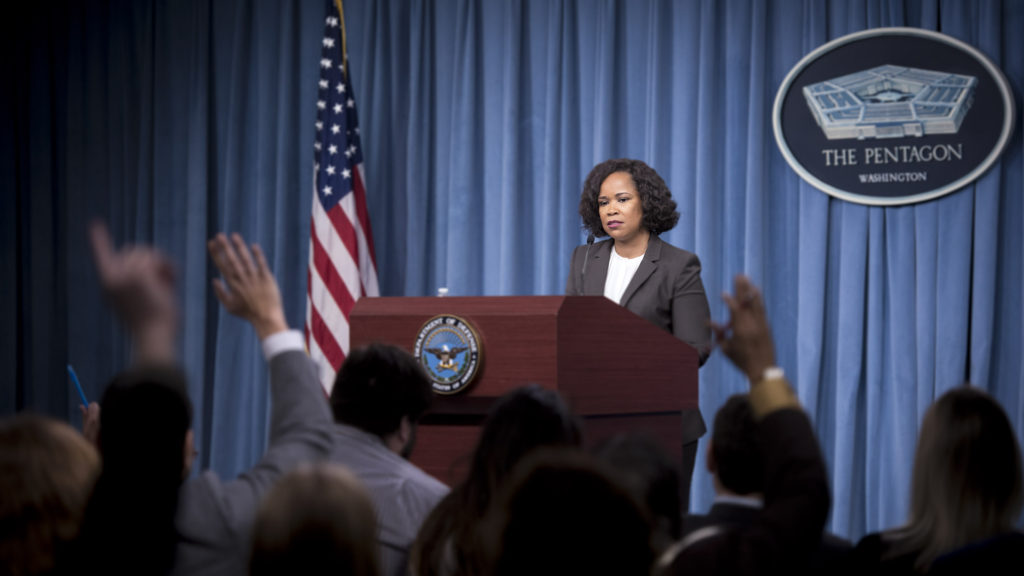The U.S. military’s Syria mission has not changed and troops will remain for now, the Pentagon said Thursday, days after President Donald Trump said he wants U.S. forces to leave the country.
“Our position in Syria has been to defeat ISIS,” Pentagon spokesperson Dana White told reporters.
“That mission has not changed,” she added.
Establishment alarm bells began ringing last week when Trump said the U.S. would be coming out of Syria “very soon,” a position he reiterated on Tuesday when he said he wanted to “bring our troops back home.”
Many of his top aides worry a premature pull-out would have far-reaching negative consequences, both in terms of ensuring a lasting defeat of ISIS and enabling Russia, Turkey and Iran to advance their own interests in the country.
The Associated Press reported that, according to three unnamed U.S. officials, Trump has indicated he would like all troops out within six months, which would be just before the U.S. midterm elections.
The White House on Wednesday said the U.S. mission in Syria would come to a “rapid end,” but failed to put a timetable on an eventual withdrawal.
“I’ve heard rumors of people talking about withdrawal,” White said. “I know the president said “very soon,” because we have been very successful with defeating ISIS. But it’s not over, and we are committed to ensuring the defeat of ISIS.”
Another Pentagon spokesperson, Lieutenant General Kenneth McKenzie, also said the military policy remains the same.
“We’ve always thought that as we reach finality against ISIS in Syria we are going to adjust the level of our presence there, so in that sense nothing actually has changed,” he said.
Asked what the defeat of ISIS would look like, McKenzie said said that he thought it too simple to think about just reaching end state in Syria, instead defining success as rendering the group “unable to generate successful attacks against the homeland of the United States or against our allies.”
“I would tell you that we’re very close to completing the final end of the caliphate – the physical caliphate in Syria,” the general added.
McKenzie declined to comment when asked why Kurds would want to keep fighting ISIS for America when Trump has signaled his willingness to leave Syria.
The United States has since late 2014 led the Global Coalition Against ISIS in Syria and Iraq, but steady gains have stalled in recent weeks as Coalition-backed Syrian Democratic Forces fighters switched their focus to defend the mainly Kurdish enclave of Efrin from Turkish troops and their allied Syrian opposition fighters. Efrin was however captured on March 18.
White said “the activities in northern Syria have distracted the SDF” from the fight to defeat ISIS.
Turkey has repeatedly threatened to expand its campaign to other Syrian Kurdish-held territory as far as the Iraq border in the east, as well as against Manbij, where U.S. forces have been deployed since March 2017 to reassure the SDF and deter hostilities between factions on the ground.
On March 28, Turkey’s MGK national security council said that if the mainly-Kurdish People’s Protection Units (YPG) does not leave Manbij, Turkey would “not hesitate to take initiative by itself as it did in other regions,” an apparent reference to the military operation against Efrin.
The following day, on March 29, a bomb in the northern Syrian town of Manbij killed two Coalition personnel – one American and one British – and injured five others. Four days later, on April 2, military.com reported an unnamed Pentagon official as saying that a “planned reinforcement” had taken place in Manbij.
Turkey’s state-run Anadolu news agency claimed as many as 300 additional U.S. troops had been deployed north of Manbij near the front line that divides territory held by Turkey-backed Syria rebels and the SDF-aligned Manbij Military Council, but the Pentagon official said this estimate was overblown.
On Wednesday, Pentagon spokesperson Eric Pahon told The Defense Post that he could not discuss movements of forces within Syria but that “commanders are delegated the authority and the responsibility to position the number of people and resources needed to accomplish the mission and to protect themselves. Occasional modifications to force size would therefore be normal.”
With reporting from AFP
This story was updated on April 5 to include additional quotes



